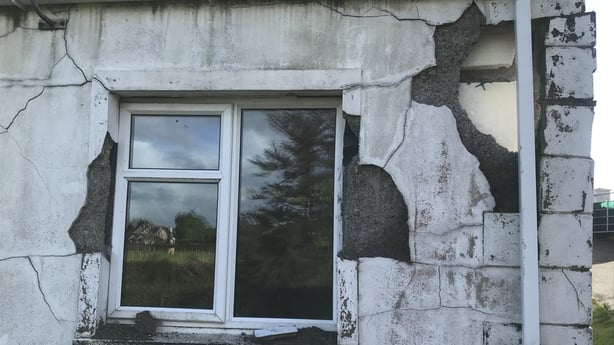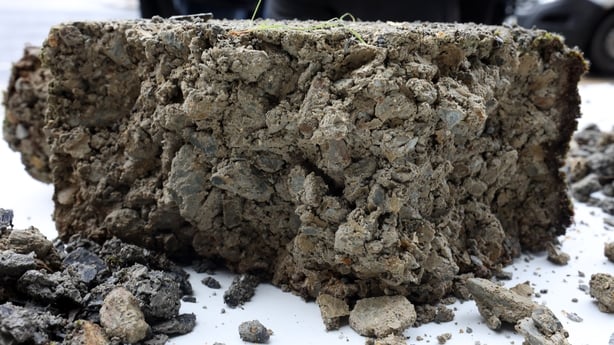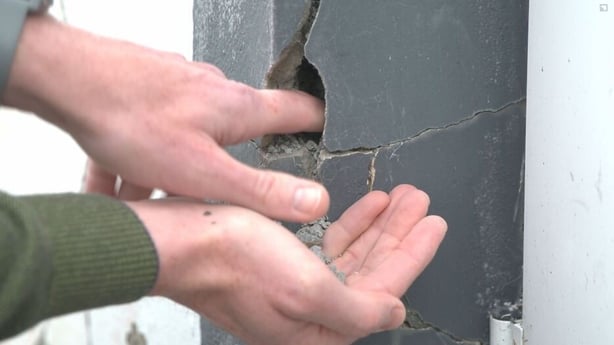Defective concrete block homeowners in Co Donegal are calling on the Housing Agency to stop downgrading redress applications until a review of the testing standard is complete.
Over 100 defective concrete block homeowners in Donegal who applied to the defective concrete block redress scheme had their engineer's remediation recommendation downgraded.
Councillor Joy Beard, who is a member of the 100% Redress Party in Donegal has called on Minister for Housing Darragh O’Brien to have the review of the testing standard completed "a matter of urgency".
"The scientific evidence is there. It's undeniable these homes must be demolished. It's the only solution.
"A sticking plaster over these properties is not going to work. All the applications that have been downgraded need to be rescinded," Cllr Beard added.
Under the enhanced redress scheme introduced last year the Housing Agency was tasked with examining all applications initially submitted to local authorities under the first scheme.
Homeowners who applied to the first scheme appointed chartered engineers listed on a specialist register for assessing their homes.

The Housing Agency chartered engineers listed on the same register are assessing application submitted to local authorities between June 2020 and June 2023.
The Housing Agency told RTÉ News it issued 315 decisions on applications initially made to Donegal County Council at the end of last month.
Of the remediation options recommended, 192 (61%) were the same as the applicant’s engineer; 111 (35%) were of a lower order than the applicant’s engineer; 9 (3%) were of a higher order than the applicant’s engineer; 3 (1%) refusals of an appropriate remediation option.
There are five remedial options available under the enhanced scheme, ranging from full demolition and rebuild to lesser options of demolition and rebuild.
Marti McElhinney's chartered engineer recommended full demolition of their home. However, the Housing Agency’s own chartered engineer did not agree in their decision.
"They're asking us to leave defective concrete blocks inside our homes. They want us to rebuild on top of these defective blocks that are load bearing," she said.
Ms McElhinney added: "The latest scientific research shows that these blocks could crumble in the future, and they are not considering the primary cause of the deterioration of our homes, which has been proven to be internal sulphate attack due to the presence of pyrrhotite. What they are putting us through is wrong."

A representation from Donegal representing more than 100 redress applicants who had their original engineer remediation recommendation downgraded held a meeting with Engineers Ireland last week.
A spokesperson for Engineer’s Ireland said they "had a constructive engagement regarding homeowners’ concerns and will raise appropriate issues with key stakeholders".
When asked about formal complaints against engineers who assessed homes, the spokesperson said Engineers Ireland cannot comment on matters relating to complaints.
They added, however, "any complaint received by the organisation will be appropriately assessed".
Angela Ward from the Mica Acton Group said the downgrading professional recommendations is eroding confidence in the "integrity of the assessments provided by Housing Agency engineers".
She added that "homeowners find themselves in an untenable position, many facing significant financial losses and mental distress".
Almost three years ago the Government tasked the National Standards Authority of Ireland (NSAI) with reviewing the testing standard used to assess homes suspected of containing defective concrete blocks.
A spokesperson for the NSAI said the review will initially take the form of an extensive amendment which is expected to be published for public consultation soon.
They added: "NSAI recognises the urgency of the review of I.S. 465 and is treating this as top priority."
Managing Director of Engineers Ireland Damien Owens told an Oireachtas Committee last May that while the outcome of this review should not be pre-empted, it was "nevertheless the view of many engineers that the existing standard is no longer fit-for-purpose".

Mr Owens said that "developments and the scientific understanding of this issue must be appropriately considered".
Furthermore, he added that completion of this review was both essential and urgent given the requirement of engineers employed by the Housing Agency to recommended remedial options for properties.
A spokesperson for the Housing Agency said their role "is established in the legislation which underpins the Defective Concrete Blocks Grant Scheme. Any changes to the scheme are a matter for the Department of Housing, Local Government and Heritage".
International peer-reviewed academic research published last year found the mineral mica was not the primary cause of the failure in Donegal homes, but rather pyrrhotite.
The authors of 'The mica crisis in Donegal, Ireland – a case of internal sulphate attack?’ said blockwork containing pyrrhotite "could potentially fail in the future."
The NSAI spokesperson said the full review of the testing standard used to assess homes is dependent on final research outputs, expected to conclude later this year.
A spokesperson for the Department of Housing said a Government decision of 30 November 2021 on the enhanced Defective Concrete Blocks grant scheme identified a number of technical research and review matters, which were assigned to the NSAI to address, including making recommendations, containing the following:
A review of the IS 465:2018+A1:2020 Standard and its application.
A review by NSAI Masonry Committee of the Irish Standard for Concrete Blocks (including aggregates).
A review of the impact of pumped cavity wall insulation on cavity wall construction and within homes susceptible to or impacted by defective concrete blocks.
A spokesperson for the Minister added: "It must be noted that the enhanced DCB scheme, upon which determinations are made, is evidence based, and that any future changes to be made will also need to be evidence based."
The Department has engaged regularly with the NSAI on the matter in seeking to progress the review and has been informed that the NSAI are aiming to publish a draft public consultation to IS465 in the coming weeks.







